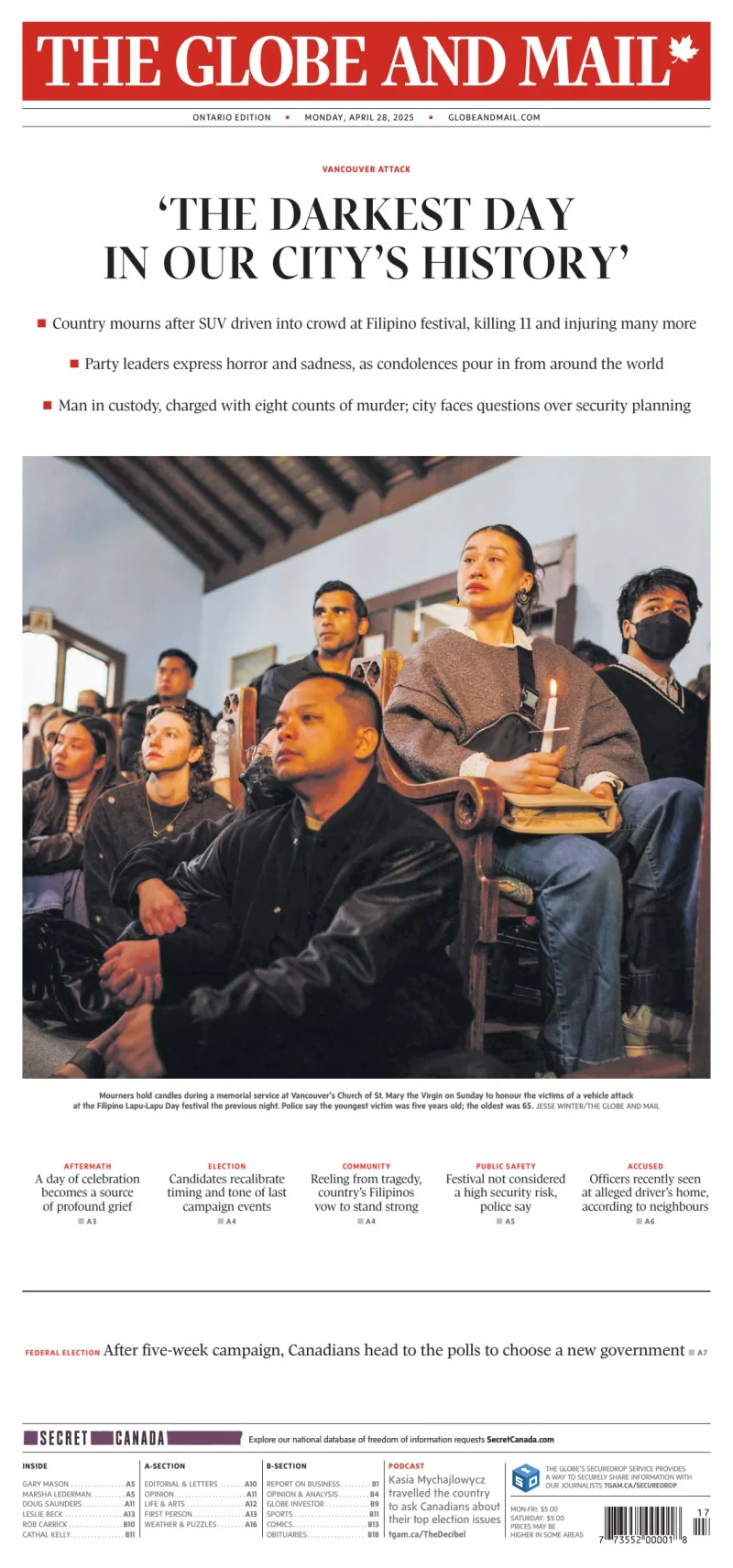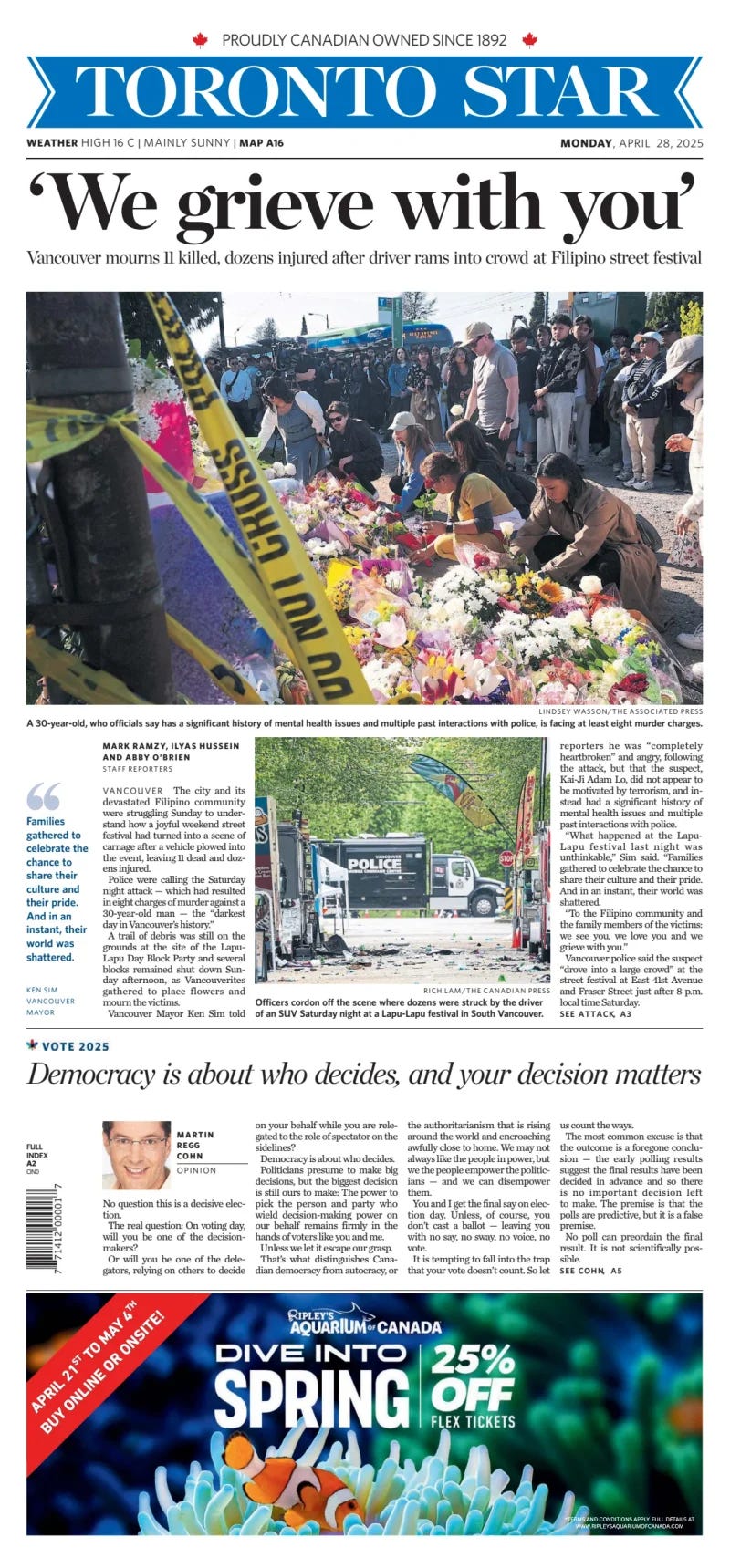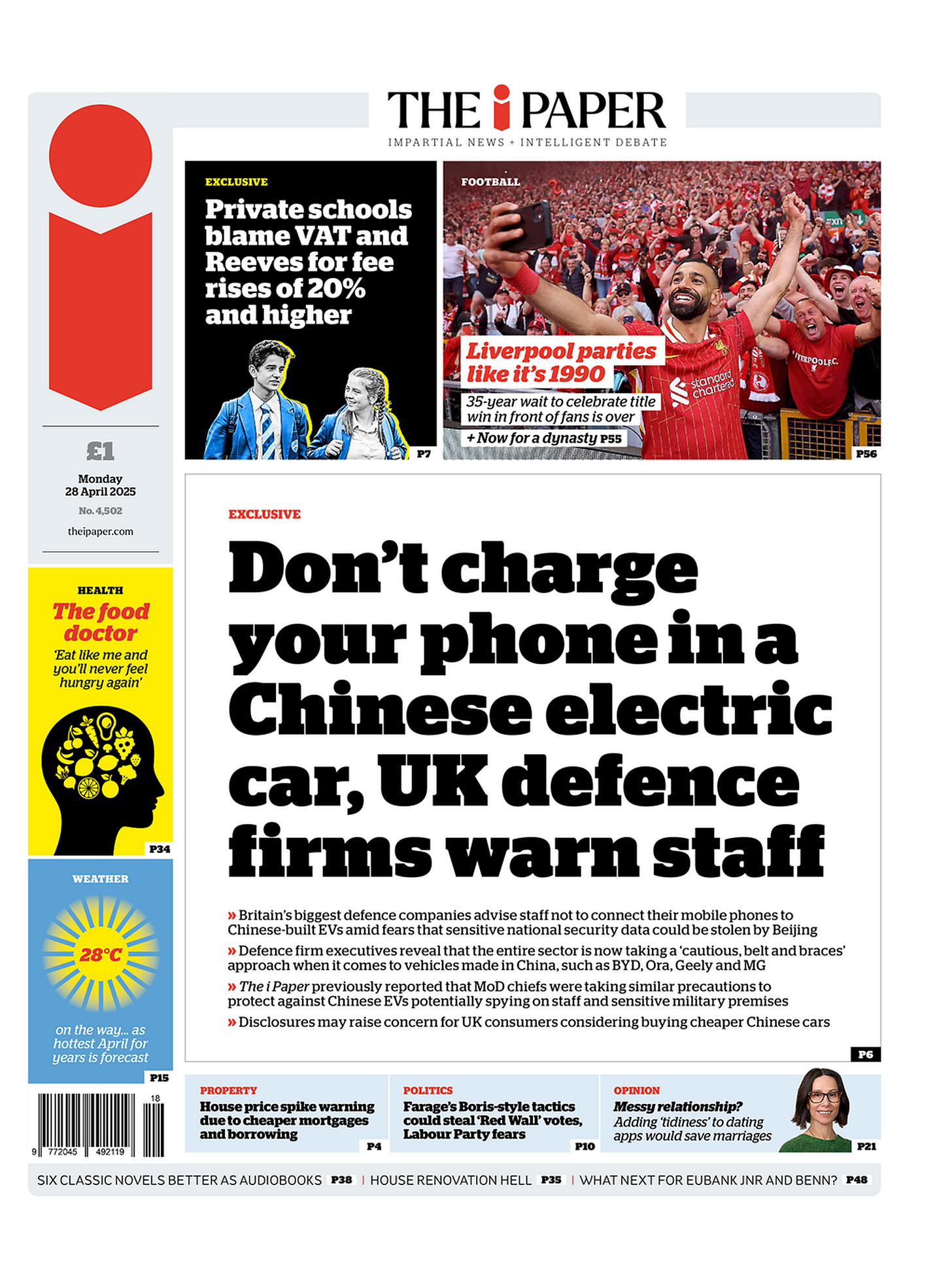Putin's Ceasefire Gambit: Another Hollow Promise?
The Ukrainians aren’t buying what looks like another Kremlin trick to win over Donald Trump
Russian President Vladimir Putin has declared an unexpected three-day ceasefire in Ukraine from May 8-10, while Russia celebrates Victory Day over Nazi Germany in World War II. US President Donald Trump did not see Putin's three-day pause as satisfactory and wants permanent ceasefire in Ukraine, his spokeswoman said on Monday. Meanwhile, Ukrainian Foreign Minister Andrii Sybiha, in response to Russia's 3 day truce, said: "If Russia truly wants peace, it must cease fire immediately. Why wait until May 8th?" A ceasefire should be "real, not just for a parade," he posted on X - France 24
The statement announcing the cease-fire said that Russia was ready “for peace negotiations without preconditions.” But it added that those talks should be “directed at eliminating the root causes of the Ukrainian crisis,” a reference to Mr. Putin’s sweeping demands for change in Russia’s favor in Ukraine and in Europe, The New York Times reported. It added: “Mr. Putin appears convinced that he would give up negotiating leverage if he stops fighting without securing major concessions first, Russian analysts and people close to the Kremlin say. His demands go well beyond claims on Ukraine’s territory, extending to limits on its future military capability and a ban on admitting it to the NATO alliance.”
My comment: Here’s roughly what I told CNN’s Becky Anderson (video at bottom) today when asked about Putin’s declaration. Interesting, isn’t it, that on one side of the Atlantic we have the self-declared "Master of the Art of the Deal" and on the other, the "Master of the Gimmick." What we’re seeing is a two-pronged gimmick. Putin isn’t interested in peace — he’s interested in saving his own skin and placating Donald Trump. He’s trying to create a mirage for Trump that he’s serious about ending the war. It’s telling that a man who once projected strength and infallibility now seems rattled, especially after another targeted assassination of a senior Russian general. He may fear Ukrainian special operations forces operating in Moscow — and on a day as open as Victory Day, that threat feels real. Meanwhile, Russia’s Foreign Ministry released a new document for the "final settlement" of the Ukraine crisis, pushing maximalist demands: international recognition of Crimea and the four occupied oblasts as Russian, Ukraine renouncing its NATO bid, lifting of sanctions, and “overcoming the legacy of the neo-Nazi regime which took power in Kiev (sic) after the February 2014 putsch.”

Canadians are voting today in a deeply consequential election that will decide who the country’s next leader will be, its response to President Trump’s threats and the shape of its economic future at a time of global turmoil. Pre-election opinion surveys showed the Liberal Party led by Prime Minister Mark Carney with a slight advantage over the Conservative Party and its leader, Pierre Poilievre, as voters headed to the polls to elect their parliamentary representatives. The leader of the party that wins the most seats will become prime minister. Three more parties, all projected to secure small numbers of seats in the country’s parliament, the House of Commons, are in the fray: the left-wing New Democratic Party, the Greens, and the Bloc Quebecois, which is focused on gaining sovereignty for Quebec. Just three months ago, the Conservatives had been leading polls by more than 25 percentage points and Mr. Poilievre was all but certain to become Canada’s next prime minister. Justin Trudeau and the Liberals had led the country for a decade, becoming increasingly unpopular. But Mr. Trudeau’s resignation in March and Mr. Trump’s tariffs and sovereignty threats against Canada upended the race. With Mr. Carney as the party leader and prime minister, the Liberals rapidly gained support as the ones to better handle Mr. Trump. In Canada’s parliamentary system, voters choose who they want to represent their electoral district, known in Canada as a riding; the candidate who has the most votes wins, and the party that has the most seats becomes the ruling government, even if they do not control the majority. There are 343 seats in parliament. But the two leaders vying to become Canada’s next prime minister are central to the choice Canadians will be making on Monday, and they offer different personalities, experiences and visions for the nation at a critical juncture - NYT
Through a single social media post today, Trump may have handed an election victory to Carney. The current occupant of the White House encourage Canadians to vote for him (Trump)
The trading site Kalshi, which called the landslide for Donald Trump last year, is predicting a Liberal majority government - handing a whopping 81 percent to Carney and just 19 percent to Poilievre. In terms of which party will form the next government - the Liberals are at 60 percent, Conservatives at 14 percent. The pro-labour New Democratic Party is at risk of waving goodbye to their official party status with just 1 percent.
The horrific SUV attack at a Filipino festival in Vancouver over the weekend — which killed at least eleven and injured dozens — could influence how Canadians vote today, I told BBC News (video above). Some may be swayed toward a law-and-order candidate like Pierre Poilievre, who advocates life sentences for mass murderers, while others may rally behind the Liberals, traditionally seen as the party of social justice and support for marginalized communities. The suspect reportedly had multiple previous interactions with Vancouver police and mental health professionals.
That the former prime minister Justin Trudeau was nowhere to be found during the campaign leading to Election Day was a quiet relief to Liberal Party candidates on the trail. Trudeau, who is reportedly renting a home in Ottawa, has not played a role in the Liberals’ national campaign. He emerged on the trail just once, to help his former deputy chief of staff campaign in her electoral district — which Trudeau held for 13 years. Days after he left the Prime Minister’s Office for the last time, Trudeau posted a selfie of himself shopping for home goods at a Canadian Tire, a retail chain similar to Walmart. And then he faded from the political scene, which turned out to be just fine by Canadians - Politico
Since the Covid-19 pandemic, the national capital’s central business district has remained largely deserted. Federal civil servants, sent home to work remotely, have been slow to return despite Treasury Board directives requiring at least three days a week in the office. Even today—Monday and voting day—the area feels unusually quiet. A recent media report revealed that in some ministries, large numbers of public servants are ignoring the return-to-office guidelines. The impact on Ottawa businesses has been severe, forcing many to close or cut hours.
In Portugal, official sources told millions they could still spend night in the dark as Spain and Portugal work to restore power after a massive outage. Power is gradually beginning to be restored across Spain after a widespread power outage earlier on Monday, the national grid operator has said. Red Eléctrica said power is available again in northern Spain following the national outage, which also affected Portugal, Andorra and parts of France. The grid operator didn’t say how long it would take to resume full service across the network, but warned customers it would take time, with around half of the national grid currently re-energised. The operator of the French national grid, RTE, said it is helping to provide power to Spain’s network and Ukraine’s Energy Minister German Galushenko also offered Kyiv's "knowledge and experience" to help restore power. Earlier Madrid's Barajas International Airport and Lisbon's Humberto Delgado were closed after being left without power, and telecommunications have also been affected, with residents across the two countries saying they have no access to mobile networks. Meanwhile, other airports have come to a standstill throughout the Iberian Peninsula, and flights from Brussels and other European cities to Spain and Portugal have been cancelled, leaving hundreds stranded, Euronews has learned. Numerous passengers have also been left stranded in the metro systems of the Spanish and Portuguese capitals, with trains stuck in tunnels between stations, Euronews Portugal reports. The blackout has affected hospitals, too, including Madrid's La Paz and multiple medical facilities in Portugal, with some being forced to cancel surgeries. The cause of the peninsula-wide outage has not yet been determined. Spain's national cybersecurity office, the National Cryptologic Centre (CCN), stated that it had gathered evidence indicating the power outage could be the result of a cyberattack. Juanma Moreno, president of the Andalusian regional government, also confirmed the possibility of a cyberattack and advised citizens to exercise caution - Euronews
The conclave to elect the 267th Pope will begin on May 7th. The date was set on Monday morning by the approximately 180 cardinals present (just over a hundred of whom are electors) gathered for the fifth General Congregation in the Vatican. The conclave will take place in the Vatican’s Sistine Chapel, which will remain closed to visitors during those days, Vatican News reported. But the coming days before the conclave begins will see competing factions of Catholics, including many laypeople, campaigning in the Vatican and the US to influence the church’s future – none with more urgency than those discontented with Francis’s liberal reign, the Guardian says. “American Catholics will fight to play a central role. Soon after the news of Francis’s death reached faithful the world over, the American counter-revolution mobilized, Vatican watchers say. Red-eyes to Rome were booked. Long-distance phone calls were made. Various cardinals likely received sudden dinner invitations.” It added: “Steve Bannon, perhaps the most public and inflammatory voice of rightwing Catholic discontent, has said he intends to organize a “show of force of traditionalists” with confrontational “wall-to-wall” media coverage. Most politicking, however, will take the form of quieter wheeling and dealing.”
Iranian officials have raised the death toll to 46 in a massive explosion purportedly linked to a shipment of a chemical ingredient used to make missile propellant in the southern Iranian port city of Bandar Abbas. Authorities have yet to offer a clear explanation for what caused the April 26 blast at the Shahid Rajaei port, although independent experts said it appeared to be due to the improper storage of sodium perchlorate, a component used in rocket fuel. On April 28, state media reported that a fire triggered by the blast, which also left more than 1,000 injured, was still burning but under control. The speaker of Iran's parliament, Mohammad Baqer Qalibaf, said in a statement on April 28 that a massive investigation involving "supervisory, security, and judicial agencies and representatives of four parliamentary commissions" is being conducted to uncover any negligence or criminal intent in incident and that the findings will be made public. The Shahid Rajaei port is Iran's busiest, processing up to 80 percent of the country's shipping traffic - RFE/RL




